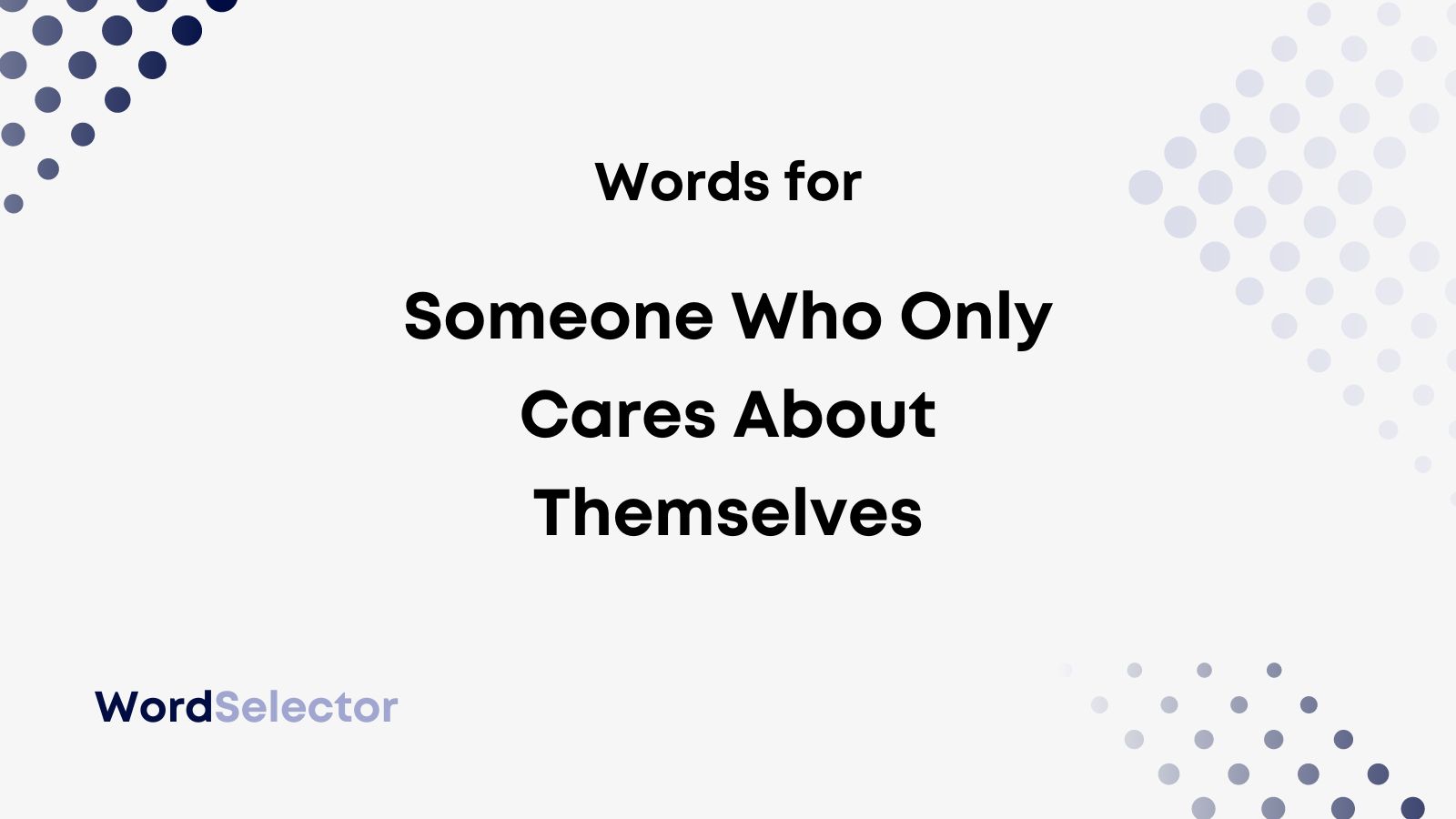We’ve all met someone who just can’t get enough of themselves!
But is there a word in English for someone who doesn’t care about anything beyond their own wants and needs?
Below, we’ve compiled a list of great terms that you can use when you meet someone who only cares about themselves.
Words for Someone Who Only Cares About Themselves
- Selfish
- Egocentric
- Narcissist
- Self-absorbed
- Egotistical
- Self-important
- Self-serving
- Conceited
- Unempathetic
- Self-obsessed
KEY TAKEAWAYS
- You can call someone who cares only for their own self-interest “selfish.”
- An “egocentric” person always centers themselves and their desires in any situation.
- A “narcissist” denotes someone in love with themselves or someone who suffers from narcissistic personality disorder.
Keep reading to see how we’ve used our top three terms for someone who only cares about themselves in some helpful example sentences!
Selfish
The most appropriate word for someone who only cares about their own feelings is “selfish.”
According to Merriam-Webster, someone who is “selfish” is “concerned excessively or exclusively with oneself: seeking or concentrating on one’s own advantage, pleasure, or well-being without regard for others.”
Therefore, it is appropriate to call someone “selfish” if they unduly prioritize their own feelings and pursuits.
Putting yourself first isn’t inherently a bad thing. In fact, it is often necessary! However, when your interests conflict with the well-being of others and you have no regard for that fact, you are certainly being “selfish.”
As you can see, the word “selfish” has strongly negative connotations and is often used to critique someone who is lacking in empathy for other people’s plights.
Therefore, let’s see this term in a couple of example sentences:
Peter is the most selfish man I’ve ever met, and I’ll never forgive myself for trusting him.
I feel that she is too selfish to care for an animal; what will happen when its needs conflict with her wants?
Egocentric
The Cambridge Dictionary defines “egocentric” as “thinking only about yourself and what is good for you.”
Therefore, this is a perfect term for someone who is too self-centered to see past their own desires and interests.
The meaning behind this word makes perfect sense when you break it up into its components.
After all, an “ego” is defined as “your idea or opinion of yourself, especially your feeling of your own importance and ability.”
Therefore, someone who is “ego-centric” will center themselves in every situation, even at the expense of others!
Have a look at how we’ve used the term “egocentric” in some examples:
I’d say you’re too egocentric to be married; someone who is concerned only for their own interests has no place in a partnership of that nature.
That egocentric woman wouldn’t know her mother from a stranger – she’s too busy gazing in the mirror and considering how best she can serve her own pursuits.
Narcissist
The term “narcissist” has a number of usages in English. However, we would recommend that you use it with caution.
Merriam-Webster defines a “narcissist” as “an extremely self-centered person who has an exaggerated sense of self-importance.”
This is the more colloquial understanding of a “narcissist.”
Based on the figure from ancient Greek mythology, Narcissus, the term “narcissist” is a word to describe someone who is in love with themselves. After all, Narcissus fell in love with his own reflection in a body of water!
However, Merriam-Webster also defines the word “narcissist” as “a person affected with narcissistic personality disorder.”
People who suffer from this mental health condition may have trouble forming lasting relationships due to their inflated sense of self.
As much as dealing with a narcissist can cause suffering, a person with this personality disorder often suffers as a result of it too!
Thus, in recent times, people have taken pause at the use of “narcissist” to refer to someone self-centered. Simply, they don’t want to conflate a bit of self-absorption with a serious mental health condition!
Nonetheless, the colloquial use of “narcissism” is still very popular. Whether you agree that we should find a better term for more casual selfishness is up to you!
Let’s see the term “narcissist” in some examples:
I was in a relationship with a narcissist for several years, and I have had issues with trust ever since.
Toby is a total narcissist; he’s obsessed with his own face.

